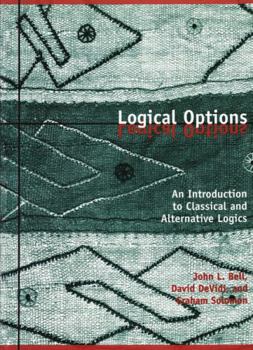Logical Options: An Introduction to Classical and Alternative Logics
Logical Optionsintroduces the extensions and alternatives to classical logic which are most discussed in the philosophical literature: many-sorted logic, second-order logic, modal logics, intuitionistic logic, three-valued logic, fuzzy logic, and free logic. Each logic is introduced with a brief description of some aspect of its philosophical significance, and wherever possible semantic and proof methods are employed to facilitate comparison of the...
Format:Paperback
Language:English
ISBN:1551112973
ISBN13:9781551112978
Release Date:April 2001
Publisher:Broadview Press Inc
Length:312 Pages
Weight:1.05 lbs.
Dimensions:0.7" x 6.5" x 8.9"
Related Subjects
PhilosophyCustomer Reviews
2 ratings
a gem!
Published by Thriftbooks.com User , 14 years ago
This book is great for beginners. I learned how to perform deduction for second-order logic based on the tableau method, from this book. There is a wealth of other topics too, as you can see from the table of contents.
Table of Contents
Published by Thriftbooks.com User , 17 years ago
I have not read this book yet, but I got the table of contents from the book's Website. This will be helpful to anyone deciding whether to buy this book. Table of Contents: Preface 1. Classical Propositional Logic 1.1. Introductory Remarks 1.1.1. Some Basic Concepts 1.1.2. Formal Logics 1.2. Propositional Logic 1.2.1. Preliminaries 1.2.2. Truth Values, Valuations, and validity 1.2.3. Implication, Tautology, and Other Important Concepts 1.2.4. Equivalence and Expressive Completeness 1.2.5. Arithmetical Representation of Statements and Logical Operations 1.3. Trees for Classical Propositional Logic 1.3.1. Tree Rules for Classical Propositional Logic 1.3.2. Trees as a Test for Validity 1.3.3. Further Applications of the Tree Method 1.4. Metatheorems 1.5. Other Proof Methods 1.5.1. Classical Propositional Calculus 1.5.2. Natural Deduction 1.5.3. Sequent Calculus 2. Classical Predicate Logic 2.1. Introductory Remarks 2.2. Tree Rules for Classical Predicate Logic 2.2.1. Rules for Quantifiers 2.2.2. Identity 2.2.3. Functions 2.3. Predicate Languages and Their Interpretations 2.3.1. The Languages 2.3.2. Interpretations: Preliminary Remarks 2.4. Set Theory 2.4.1. Sets 2.4.2. Relations 2.4.3. Equivalence Relations 2.4.4. Orderings 2.4.5. Functions 2.5. Interpretations of Languages for Predicate Logic 2.6. Validity, Satisfiability, and Models 2.7. Correctness and Adequacy 2.7.1. Some Difficulties 2.7.2. Dealing with Difficulties 2.7.3. The Proofs 3. Using and Extending Predicate Logic 3.1. Postulate Systems 3.1.1. Postulate Systems for Arithmetic 3.1.2. Noncategoricity of First-Order Peano Arithmetic 3.2. Many Sorted Logic 3.2.1. Introductory Remarks 3.2.2. Many Sorted Languages and Interpretations 3.2.3. Reducing Many Sorted to Unsorted Logic 3.3. Second-Order Logic 3.3.1. Languages and Interpretations 3.3.2. Second-Order Trees 3.3.3. The Strength of Second-Order Logic 3.3.4. Metatheory of Second-Order Logic 4. Introducing Contextual Operators: Modal Logics 4.1. The Propositional Modal Language and Models 4.1.1. The Language 4.1.2. Interpretations 4.1.3. Classes of Frames and Different Logics 4.2. Trees for Contextual Logics 4.2.1. Proving Correctness for 4.2.2. Counterexamples 4.2.3. Proving Adequacy for 4.3. Other Systems of Contextual (Modal) Logic 4.3.1. Correctness and Adequacy for Trees 4.4. Provability Logic 4.4.1. Arithmetic Provability and Contextual Logic 4.4.2. Frames and Provability Logic 4.4.3. Trees for Provability Logic 4.5. Multi-Modal Logic 4.6. Quantificational Contextua





